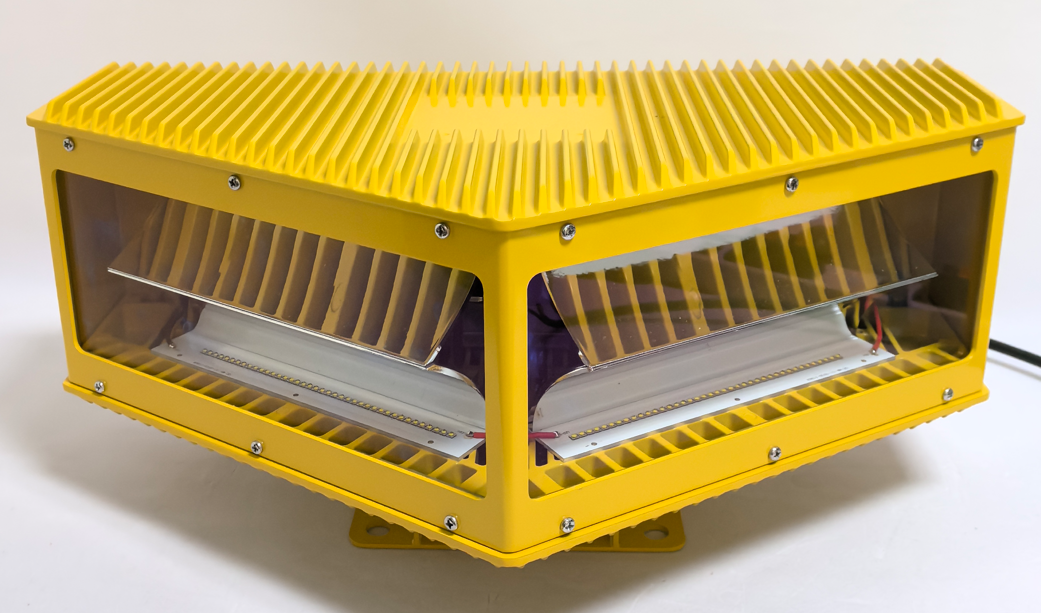Aviation Light for Chimney: Ensuring Safety in Industrial Airspaces
Industrial chimneys, particularly those in power plants, refineries, and manufacturing facilities, often extend hundreds of feet into the air, posing potential hazards to low-flying aircraft. To mitigate collision risks, aviation light for chimney installations are mandatory under international aviation regulations. These specialized warning lights ensure that tall chimneys are visible to pilots, day and night, across varying weather conditions. This article explores the importance, types, and best practices for aviation light for chimney systems in industrial settings.
Why Chimneys Require Aviation Warning Lights
Chimneys are among the tallest structures in industrial zones, often exceeding 200 feet (60 meters)—well within the flight paths of helicopters and small aircraft. Without proper lighting, these structures become invisible obstacles, especially in fog, rain, or darkness.
Key Risks of Unmarked Chimneys:
Mid-air collisions with low-flying aircraft
Regulatory violations, leading to fines or legal action
Increased insurance liabilities due to safety hazards
To comply with FAA (Federal Aviation Administration), ICAO (International Civil Aviation Organization), and EASA (European Aviation Safety Agency) standards, industries must install certified aviation light for chimney systems.
Types of Aviation Lights Used on Chimneys
Different chimney heights and locations require specific lighting configurations. The most common types include:
1. Low-Intensity Red Obstruction Lights (L-810)
For chimneys under 200 ft (60 m)
Steady-burning red LED lights
Energy-efficient and low-maintenance
2. Medium-Intensity Red/White Lights (L-864 & L-865)
For chimneys between 200-500 ft (60-150 m)
L-864: Steady red light for nighttime
L-865: Flashing white light for daytime
Dual lighting ensures visibility in all conditions
3. High-Intensity White Strobe Lights (L-856)
For chimneys exceeding 500 ft (150 m)

Powerful white strobes visible for miles
Used in areas with high air traffic
| aviation light for chimney |
Key Features of an Effective Aviation Light for Chimney System
Modern chimney lighting solutions incorporate advanced technologies for reliability and efficiency.
1. LED Technology
Longer lifespan (up to 100,000 hours)
Lower power consumption than traditional incandescent lights
2. Corrosion-Resistant Materials
Stainless steel or polycarbonate housings to withstand harsh industrial environments
| aviation lights for chimney |
3. Automatic Light Sensors
Adjust brightness based on ambient light (day/night mode)
4. Redundancy & Backup Power
Dual power sources (solar + battery backup) for uninterrupted operation
5. Remote Monitoring & Alerts
IoT-enabled diagnostics for real-time fault detection
Installation Best Practices for Chimney Aviation Lights
Proper installation ensures compliance and optimal performance.
1. Positioning & Spacing
Lights should be placed at the top and midpoint of tall chimneys.
Multiple lights may be required for structures over 300 ft (90 m).
2. Compliance with Local Regulations
Follow FAA AC 150/5345-43J (USA), ICAO Annex 14 (global), or EASA (Europe) standards.
3. Weatherproofing & Maintenance
Regular cleaning to prevent soot buildup on lenses
Inspection of electrical connections for corrosion
Future Trends in Chimney Aviation Lighting
Emerging technologies are shaping the next generation of aviation light for chimney systems:
1. Solar-Powered LED Lights
Reduces dependency on grid power
Ideal for remote industrial sites
2. Smart Lighting with AI Integration
Predictive maintenance using machine learning
Automated brightness adjustment based on weather
3. Wireless Monitoring Systems
Real-time alerts via cloud-based platforms
An aviation light for chimney is not just a regulatory requirement—it’s a critical safety measure that protects aircraft and prevents catastrophic accidents. With advancements in LED efficiency, smart monitoring, and durable designs, modern chimney lighting systems offer reliable, long-term solutions for industrial facilities.
By investing in high-quality aviation light for chimney installations, industries can ensure compliance, enhance safety, and contribute to safer skies for pilots and the public alike.
